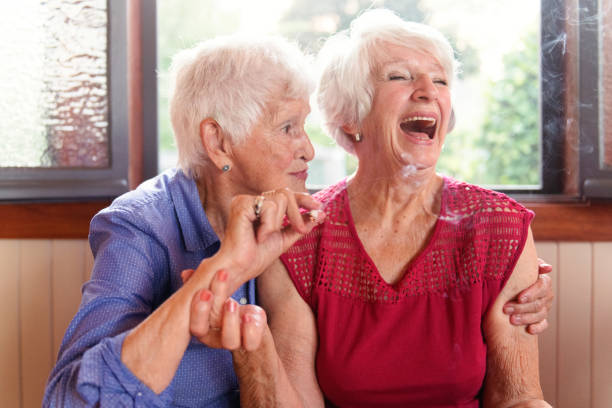
This isn’t your grandparents’ marijuana – Cannabis News, Lifestyle
This isn’t your grandparents’ marijuana. You’ll hear this often if you haven’t already. Substitute grandparent for parent and the meaning is the same.
In the “good old days” like the 1960s and 70s, cannabis contained no more than 2% THC. In the 1990s it was 4%.
But now, in the legal states, cannabis flowers have up to 30% THC. You can find 99% THC levels in concentrates, edibles, and vapes.
Name the new cannabis temperance movement. This isn’t your grandparents’ marijuana.
This is actually your grandparents’ marijuana
First, it’s called cannabis. Marijuana is a slang term that stems from a racist past. In a society that renames sports teams and fabricates history to correct past mistakes, it’s amazing that people still call cannabis marijuana.
Second, the “This isn’t your grandparents’ marijuana” meme is factually incorrect.
Our body has its own cannabinoid system. This physiological system regulates our mood, pain, sleep, and stress responses. Among other things, it is responsible for our cardiovascular function, muscle building, metabolism and motor skills.
If you think of your brain and body as a busy crossroads, the endocannabinoid system is the light. Let cars, bikes and pedestrians know when it’s safe to cross.
Everyone has cannabinoid receptors throughout the brain and body. Cannabis is a plant with plant cannabinoids, or phytocannabinoids, that mimic the natural endogenous ones that our bodies produce.
CBD is one of the most popular of these plant-based cannabinoids. Technically psychoactive, people don’t feel stoned or high, even with large doses. CBD users report less anxiety, better sleep, less inflammation, and an overall sense of well-being from consumption.
Modern cannabis contains more of these cannabinoids than cannabis from a few decades ago. The reasons are clear: the ban meant that cannabis flowers could not reach their potential.
Anyone who says, “That’s not your grandparents’ marijuana” is factually wrong.
It’s the same plant. Same genus. same kind
This isn’t your grandparents’ THC marijuana
When people say, “This isn’t your grandparents’ marijuana” or “This isn’t your parents’ marijuana,” what they’re really saying is that the THC content of modern-day cannabis is too high for their liking.
But the beauty of the modern cannabis industry is its diversity.
You can buy cannabis flowers with low levels of THC. You can buy THC cannabis in balance with CBD. CBD and THC compete for the same cannabinoid receptors, so the high isn’t as intense.
But the cannabis temperance movement is not about free choice. When they say, “This isn’t your grandparents’ marijuana,” they mean that the THC content of modern-day cannabis is too high for anyone.
These people don’t understand the economics of Prohibition. To quote Milton Friedman: “If you look at the drug war from a purely economic perspective, the government’s role is to protect the drug cartel. That is literally true.”
But I’ve never met a busybody who understands business.
Assuming it were true that this isn’t your grandparents’ marijuana, that high levels of THC would be dangerous and unhealthy. The temperance elves still have no foundation to stand on.
As Thomas Sowell said, “Crusaders [against substances] cannot accept the fact that they are not God, that they have neither the right nor the authority to direct the lives of other people.”
If THC limits become the norm, all that has been achieved is a guaranteed income stream for the legacy markets.
But is THC dangerous?

By saying, “This isn’t your grandparents’ marijuana,” the cannabis temperance movement wants you to believe that THC is somehow dangerous. They will make claims about psychosis and addiction, anxiety and depression.
But as with other subjects, the narrative you get depends on which “expert” you listen to. Many studies link poor mental health to cannabis use. But the question remains: are people with mental health problems looking to cannabis as a medicine, or is high-THC cannabis causing poor mental health in people?
Our bias is clearly in the direction of the former, but we do not seek to legislate our beliefs. Do what you want. If you think that high-potency cannabis could cause mental health problems, don’t consume it.
See how easy that was?
“This isn’t your grandparents’ marijuana” is a way of justifying control and restricting individual freedoms.
People with influence and power usually try to increase them. Because of this, the principle of freedom must remain strong, even when it comes to things that some consider “trivial” like THC limits.
Cannabis users want high THC levels. You will find a way to get it. There is no moral, medical, or economic reason for THC limits. “That’s not your grandparents’ marijuana” is pure shock.

Post a comment: